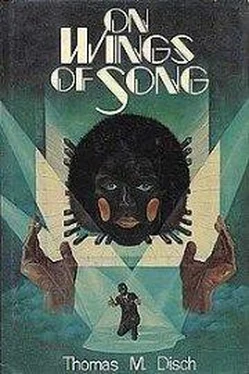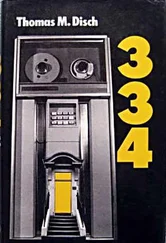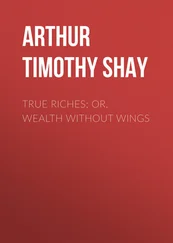The halo glinted.
“If you want to come back later, you’ll have to come back to him. Maybe that’s what you’ve been waiting for. Am I right?”
He leaned forward, careful not to touch the tube that snaked into her left nostril, and kissed the lips that were legally dead. Then he got up and went out into the hall and down the hall to Mrs. Schiff’s office, where the telephone was.
In all these years he’d never forgotten the phone number for Worry.
An operator answered at the third ring. He said he wanted to speak to Grandison Whiting. The operator asked his name. He said only that it was a personal call. The operator said she would give him Mr. Whiting’s secretary.
Then a new voice said, “Miss Weinreb speaking.”
Daniel was too taken aback to reply.
“Hello?”
“Hello,” he echoed, forgetting to use the deeper voice with which he’d addressed the operator. “Miss Weinreb?”
Which Miss Weinreb? he wondered. His secretary!
“I’m afraid Mr. Whiting isn’t available at the moment. I’m his secretary. Can I take a message?”
In the other room Daniel could hear the telephone ringing. But it couldn’t be the telephone. It must be the doorbell. In which case Mrs. Schiff would answer it.
“Which Miss Weinreb would that be?” he asked cautiously. “Cecelia Weinreb?”
“This is Aurelia.” She sounded miffed. “Who is this , please?”
“It’s a personal call. For Mr. Whiting. It concerns his daughter.”
There was a long silence. Then Aurelia said, “Which daughter?” Hearing her dawning surmise, he became uneasy.
At that moment Mrs. Schiff burst into the office. In one hand she held the halo from Boa’s head. He knew, just by looking, what she was going to tell him. He replaced the phone in its cradle.
It hadn’t been the doorbell.
“It’s Boa,” he said. “She’s come back.”
Mrs. Schiff nodded.
Boa was alive.
Mrs. Schiff put the halo down on top of the desk, where it rocked unsteadily. Her hands were shaking. “You’d better go see her, Daniel. And I’ll phone for a doctor.”
A week after it opened at the Cherry Lane, Honeybunny Time was transferred uptown to the St. James Theater, right across the street from the Metastasio, and Daniel was a star. His name, his own name, the name of Daniel Weinreb, was spelled out on the marquee in winking lights. His face, dark as molasses, could be seen on posters all over the city. His songs were on the radio day and night. He was rich and he was famous. Time featured him on its cover, rabbit ears and all, under a 36-point rainbow-shaped and hued headline asking, portentously: BEL CANTO — IS THAT ALL THERE IS? Inside, in an exclusive article, Mrs. Schiff told something like the story of his life.
It was not his doing. Or perhaps it was. The phonecall to Worry had been automatically recorded and traced by Whiting’s security system. At his sister’s suggestion, the voice-prints of the call were compared with those of tapes Daniel had made with Boa in days gone by.
The police appeared at the door of Mrs. Schiff’s apartment at the very moment the curtain was going up on Honeybunny Time . Mrs. Schiff, presciently indisposed, was on hand to receive them. Boa had already been taken off to a clinic to recuperate from the effects of her fifteen-year-long coma and so was spared the first onslaught. When the police had finally been persuaded that only Daniel could supply them with the name of the clinic and had been dispatched to the Cherry Lane, Mrs. Schiff, seeing that the cat was, in any case, out of the bag, decided to cash in her chips. With Irwin Tauber’s help she got through to the editor-in-chief of Time , and before Daniel had sung the closing reprise of “Honeybunnies Go to Heaven,” she had struck a deal, giving Time exclusive rights to her own 4,000-word version of the “Romance of Daniel Weinreb.” There was no way, after that, that Honeybunny Time wasn’t going to be a hit.
Daniel was furious, but also, secretly, delighted. Even so, he determined, for form’s sake, to be angry with Mrs. Schiff for having so profitably violated his confidences. Of course, it had only been a matter of time, once his phonecall to Worry had been traced, before Daniel was apotheosized; a matter of hours, probably, as Mrs. Schiff tried, through Irwin, to explain. And to do her credit, her version of the past three years was as skillful a whitewash as any press agent could have contrived. According to Mrs. Schiff Daniel’s relationship with Rey had been based on mutual esteem and a shared devotion to the glory of the human voice. Her story dwelt mainly on Daniel’s undying love for his wife, his struggles against manifold adversities (she included his recipe for bread pudding), the discovery of his buried talent and (this last being intended, surely, as a private poke in the ribs) his Christian faith. Nowhere did she state anything that wasn’t strictly true, but it was scarcely the whole truth; nor — such were her powers as a storyteller — did the whole truth ever make much headway, once it did begin to leak out, via Lee Rappacini and a few other old friends. The media doesn’t like to waste its heroes, and that’s what Daniel had become.
Boa was preserved from most of this within the heavily guarded portals of the Betti Bailey Memorial Clinic, an upper-crust, Westchester version of First National Flightpaths. At her own orders no one but Daniel and the Clinic’s staff were to be allowed into her room. He came there once a day in a rented limousine. While the limousine waited for the gates to be opened, the press would gather round with their cameras and their questions. Daniel would smile at them through the bullet-proof glass, which served the camera’s needs. As to the questions — Where had Boa been these many years? Why had she returned? What were her plans? — Daniel was as much in the dark as anyone, for they had yet to speak to each other. Usally she was asleep, or pretending to be asleep, and he would sit by her bed, arranging hecatombs of cut flowers and waiting for her to make the first move. He wondered how much of all he’d said over the last three years she’d been at hand to take in. He didn’t want to go through it all again, and in any case little of that was any longer to the point. The Boa who’d come back bore no resemblance to the living Boa he remembered. She was the same gaunt, hollow-eyed object that had Iain all those years, inert, on the other side of his room, whom to love was as impossible as if she had been a bundle of sticks. She seemed infinitely old and wasted. Her dark hair was streaked with gray. She did not smile. Her hands lay at her sides as though she had no interest in them, as though they were not hers but only a more cumbersome piece of bed linen. Once in these two weeks of visits she had opened her eyes to look at him, and then had closed them again, when she saw that he’d become aware of her attention.
Yet he knew she was capable of speech, for she’d given orders to the staff not to admit any visitors but Daniel. Even this small distinction was scarcely a balm to his heart when he knew, through Dr. Ricker, the director of the clinic, that no one, aside from the press had sought to be admitted. Once Boa’s miraculous return to life had become a matter of public interest, her father had made himself unavailable for comment. To the rest of the world Daniel and Boa may have been the love story of the century, but to Grandison Whiting they were gall and wormwood. He was not, Daniel supposed, a forgiving sort of person.
Meanwhile, Daniel’s bandwagon rolled onwards and upwards, a triumphal chariot, a juggernaut of success. Five of his songs were at the top of the charts. The two most popular, “Flying” and “The Song Does Not End,” were songs he’d written in the sauna of Adonis, Inc., back before any of this had begun. Except, logically, it must have begun then, or even before. Perhaps it all went back to that spring day on County Road B, when he’d been stopped in his tracks by that devastating inkling of some unknown glory. Sometimes he’d look up at the issue of Time that he’d nailed to the wall of his room at the Plaza with four stout nails and wonder if that had been the actual, foredestined shape of the vision that had loomed behind the clouds that day — that dark face with its animal ears and the dumb question rainbowed over it. He would have preferred a more inward and transfiguring glory to have been intended, as who would not, but if this was what the moving finger had writ, it would be churlish not to be grateful for benefits received — and received, and received.
Читать дальше












